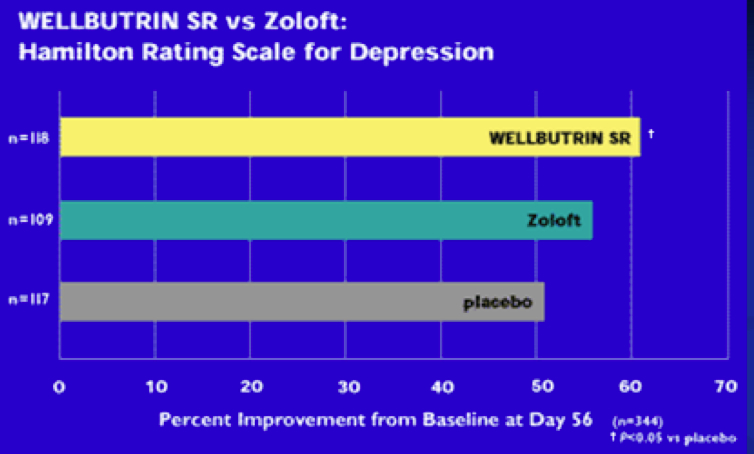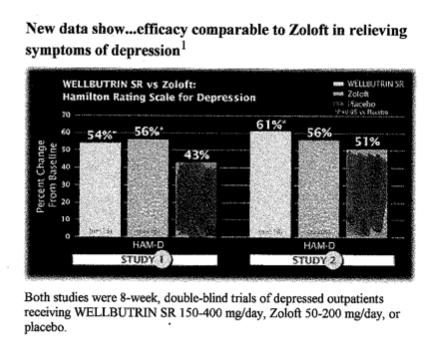For years now the placebo effect in antidepressant research has been debated, with the recent story on 60 Minutes perhaps representing a high point for media coverage of psychiatry’s evidence base- of course, occurring after most SSRIs have gone generic.
While we liked the show, we also think it’s a shame that the media took so long to finally run a high-profile story on this issue. And, we’d like to mention one interesting piece of evidence missed by the investigative team at 60 Minutes. At one point, Leslie Stahl mentioned that scientists at the drug companies say that antidepressants work. We’re sure they do say that when asked by an investigative journalist. But, if one actually looks at the materials produced by drug companies, strangely, one finds that…they are in agreement with Irving Kirsch?
While digging through some old files (research for a paper we wrote on serotonin and depression), we uncovered a web page published at Wellbutrin.com in August of 2001. Wellbutrin SR was still on patent and GlaxoSmithKline (the maker of Wellbutrin) was already using a web presence as part of their marketing plan.
In our files we also found some webpages we had printed out from wellbutrin.com, which included an advertisement with the following table:
It’s a little hard to make out in the scanned version, but the web page proclaimed:
Placebo: 51% improvement, Zoloft: 56% improvement, Wellbutrin: 61% improvement (% refers to % change from baseline, here).
These are the same sort of statistics that are seen as controversial when reported by Irving Kirsch- although here they are being pushed by a drug company as an advertisement for their product. So, at least one drug company was honestly reporting this information a decade ago.
The natural conclusion to reach after reading such data is that generalized helping and therapeutic relationship (as well as watchful waiting) would be the preferred approach to depression, since antidepressants have a risk of adverse effects but are only 10% more effective than placebo. Yet, this didn’t happen in clinical practice- this advertisement ran during a decade of widespread (unrestrained?) prescribing of antidepressants….
The American Psychiatric Association has disagreed strongly with Irving Kirsch. Apparently they also disagree with at least one antidepressant manufacturer.

















Forgive me for being a little immature, but: LMFAO.
Please tell me you’re forwarding that to: the APA, the NIMH and NAMI??!
Would love to see their response to that one.
Report comment
Ah, sorry, misunderstood.
All this stuff is very new to me, I had never really looked into any of this until last year. And have been genuinely flabbergasted.
For example, the points made in other posts about research papers being ghostwritten is astounding.
I have worked in financial services for 7 years in many countries. What they’re doing is like one of the companies we cover in Equities research writing a research paper, and then getting an employee of our Bank to stamp our logo on it. That would be the subject of (justifiable) outrage, as people would make investment decisions based on the supposed independence of the content…I simply can’t wrap my head around the idea that in relation to our health, the same principle doesn’t apply. Surely healthcare consumers are much more vulnerable than stock investors.
Report comment
Thanks for publishing this! I had never seen the Wellbutrin add. I’ll add that the American Psychiatric Association also disagrees with the FDA, whose spokesman on the 60 Minutes shows said repeatedly that the difference between antidepressant and placebo was small.
Report comment
Hello,
Just came across this site while searching for good responses and refutations of Irving Kirsch’s book on antidepressants. I’m have some trouble finding anything that is satisfactory to me.
I write because I read Nurse Katie Higgin’s comment that “psychiatrists are not critical thinkers,” and that “trained or educated to interpret scientific data.”
I’m not sure if I agree with the precise statements. I might put it more cautiously: psychiatrists have a selective lack of critical thinking when it comes to evaluating their own behaviour and treatment decisions. Why, I’m not sure. I cannot believe that they aren’t trained to interpret scientific data. I can believe they do not properly or critically interpret scientific data that fails to confirm what they believe and how they treat and diagnose patients.
I figure it is worth making this distinction, that is between a general lack of thinking ability and a specific inability or unwillingness in specific areas, because it may better put the spotlight on the conflict of interest many doctors find themselves in w/r/t drug companies. Perhaps also it points the way toward some research questions.
Kirsch notes in his book that a survey of doctors in the UK (I presume) showed only 44% would change treatment based on the findings that antidepressants don’t provide clinically significant benefits over placebos.
Is anyone aware of research on doctors that might help explain these findings, and our own anecdotal experience with doctors who appear to lack critical thinking skills. For example, I would like to see surveys of doctors that ask questions such as, “do you prescribe meds based on how well they have worked for your patients in the past?” “Why are double-blind believed to be necessary when evaluating effectiveness of medication?” Questions that get to whether doctors take precautions to prevent seeing evidence that confirms their beliefs and discounting evidence that doesn’t.
I would be very interested to see if their is research like this.
Thanks,
Report comment
By the way, in his book Kirsch says that pharmaceutical companies took his research pretty well (“they knew it all along), and have hired him to consult on designing experiments. See pages 75-76, at least of the US addition.
Thanks,
Report comment
Minor quibble: The charts show that Welbutrin is about 10 percentage *points* better than placebo, but about _20%_ more effective: (61-51)/51 = 10/51 = 19.6%
Report comment